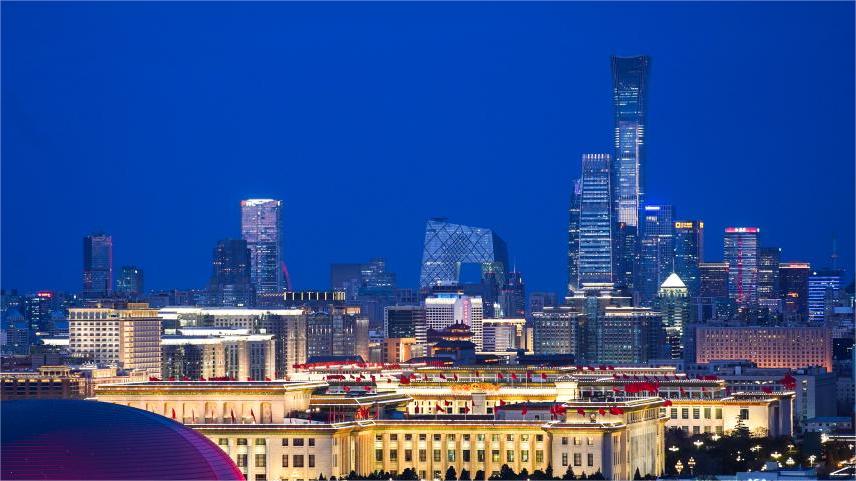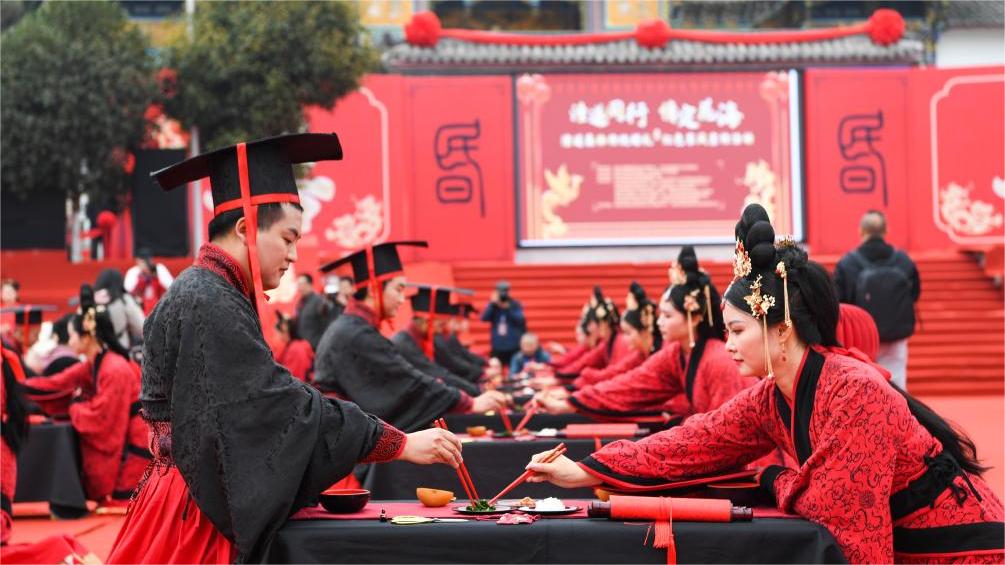Why is Xi regarded as China's another outstanding reformer after Deng?
BEIJING, March 12 (Xinhua) -- Chinese leader Xi Jinping has sounded the clarion call for reform during the country's annual key political season, dispelling concerns about whether China's reform is "stagnating," or its economy is "losing steam."
"We must plan major moves to deepen reform to inject strong impetus into promoting high-quality development and advancing Chinese modernization," President Xi said at the annual sessions of China's top legislature and top political advisory body, or the "two sessions," which wrapped up on Monday.
In the face of a myriad of challenges, China is now in a critical period for accelerating reform.
Xi is regarded as another outstanding reformer in the country after Deng Xiaoping.
The two leaders faced the same mission -- to modernize China, but against strikingly different backdrops.
When Deng launched the reform and opening-up drive in the late 1970s, China's per-capita GDP was only about 200 U.S. dollars. His push for reforms started almost from scratch.
In 2012, when Xi was elected general secretary of the Communist Party of China (CPC) Central Committee, China had become the world's second-largest economy, with a per-capita GDP of over 6,000 dollars. But growth was shifting gears and many advantages, including the once-low labor costs, had started to diminish.
Instead of resting on the laurels of his predecessors, Xi was committed to carrying on the reform, and he knew how hard it would be.
"The easy part of the job has been done to the satisfaction of all. What is left are tough bones that are hard to chew," he said.
Over the past decade, more than 2,000 reform measures have been rolled out, enabling the country to eliminate extreme poverty, promote integrated urban-rural development, fight corruption, support businesses, boost innovation, and push forward a "green revolution."
With the reform measures, the Chinese economy has not only sustained robust growth but also more than doubled since 2012, cementing the country's global status as a major growth contributor.
China is currently at a critical juncture, where Xi is leading the country to realize the ambitious "Chinese modernization," while being confronted with major challenges, such as downward economic pressure following the COVID-19 pandemic, rising protectionism and suppression from Western nations, and risks associated with the real estate sector, local government debts, and some small and medium-sized financial institutions.
Xi reiterated the significance of reform at a group study session of the Political Bureau of the CPC Central Committee earlier this year. Weeks later, at the "two sessions," he stressed deepening reforms in various sectors "to remove the barriers obstructing the development of new quality productive forces."
Looking back, Xi's commitment to reform has been consistent.
When he was not even 16, he was sent to Liangjiahe village in Shaanxi Province to do farm labor. There, he experienced hunger. Deng initiated reforms, believing that China could not remain poor. Xi's aspiration at that time was to ensure that his fellow villagers could have enough to eat.
Xi's reputation as a reformer was reinforced as his political career advanced.
In the early 1980s, he initiated reform experiments in the impoverished county of Zhengding, Hebei Province, commencing with the rural land contract trial, making Zhengding the first in Hebei to adopt this practice already tested in southern provinces.
After Zhengding, Xi was assigned to work in Xiamen, a special economic zone in Fujian Province, where Xi spearheaded the establishment of China's first joint-venture bank -- Xiamen International Bank. After he ascended to the position of governor of Fujian, Xi led reform in the collective forest tenure, which was later expanded nationwide. This initiative is known as another revolutionary step for China's rural areas after the household contract responsibility system.
During his time in Zhejiang Province, Xi proposed an innovative initiative to promote development through industrial upgrading. He actively supported private businesses, and encouraged business people to "come directly" to his office for important matters. He also extended reforms in Zhejiang beyond the economic sphere, addressing social, cultural, and ecological aspects.
Xi's reformer image left a deep impression on international figures. In September 2006, Henry Paulson, then U.S. treasury secretary, visited China and chose Hangzhou, capital city of Zhejiang, as his first stop. He regarded Xi as the "perfect choice" for his initial meeting in China, describing him as "the kind of guy who knows how to get things over the goal line."
Paulson later recounted that during a meeting with Xi in 2014, the Chinese leader stated, "My concern is mainly reform and related issues."
After assuming the Party's top post in 2012, Xi's first domestic inspection took him to Shenzhen. There, he laid a flower basket at the bronze statue of Deng Xiaoping in Lianhuashan Park, declaring a firm commitment to reform: "Reform will not stop, and opening-up will not cease!"
The Third Plenary Session of the 18th CPC Central Committee, convened in 2013 under Xi's leadership, is heralded as a milestone, much like Deng's Third Plenary Session of the 11th CPC Central Committee in 1978, which ushered in the era of reform. The 2013 event marked the dawn of a new era of reform.
During this session, Xi listed a series of challenges facing China's development, including corruption, unsustainable development, and environmental issues. He stressed that "the key to addressing these problems lies in deepening reform."
The session approved a decision on "major issues concerning comprehensively deepening reforms." A Spanish newspaper commented that Xi had initiated the most profound economic, social, and administrative reforms in China over 30 years.
More than a month later, China announced the decision to establish the Central Leading Group for Comprehensively Deepening Reform, which Xi headed. This marked the first time in the Party's history that a leadership body exclusively dedicated to reform was established at the central level. Later, this group evolved into the Central Commission for Comprehensively Deepening Reform, with Xi as its director.
(This article is an excerpt of the Xinhua story titled "Profile: Xi Jinping the reformer," which was released Tuesday.)
Photos
Related Stories
- Pakistan, China vow to cement ironclad ties
- Profile: Xi Jinping the reformer
- English edition of Xi's selected works published
- Xi's "two sessions" messages highlight China's high-quality development in crucial year
- Xi's "Two Sessions" Calendar: Xi attends closing meeting of top political advisory body's annual session
Copyright © 2024 People's Daily Online. All Rights Reserved.









